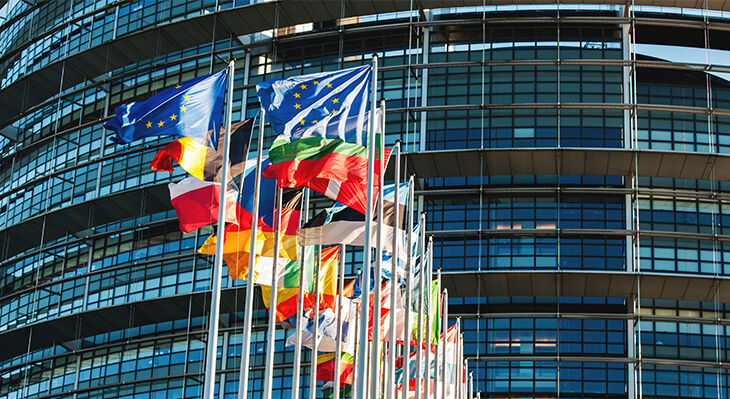European cooperation in VET
From the Copenhagen Process in 2002 to the 2020 Osnabrück Declaration: Common objectives, priorities and benchmarks for VET are being agreed upon, their progress monitored and the orientation of the process redirected.

Implementing European priorities in VET
Cedefop and ReferNet are monitoring and reporting on progress made towards the post 2020 VET policy priorities. The progress reporting is published in dedicated country policy briefs as well as in the online database Timeline of VET policies in Europe and in briefing notes.
Read more on European monitoring
Post-2020 European policy framework on VET
The European Skills Agenda for sustainable competitiveness, social fairness and resilience, presented by the European Commission on 1 July 2020, sets objectives for upskilling (improving existing skills) and reskilling (training in new skills).
Along this new agenda, the EU member states endorsed on 30 November 2020 the ‘Osnabrück declaration on VET as an enabler of recovery and just transitions to digital and green economies’. It sets out policy actions in 2021-25 to operationalise the Council recommendation on VET for sustainable competitiveness, social fairness and resilience. The member states set themselves four objectives for VET in the EU:
Innovation in VET closely relates to new skills, curricula, education methodologies and forecasting tools. Digital learning and artificial intelligence should support learners in developing their knowledge, skills and competences. VET programmes at EQF levels 5 to 8 on a par with HE are important to offer VET graduates a flexible, inclusive and valuable path to high-level jobs in response to current and future socio-economic needs.
As job and qualification profiles change and new tasks emerge in the wake of the digital and green transitions, individuals need support to upskill and update their skills. Lifelong learning means that individuals have to be able to find their way through the wide range of continuing education and training on offer, using modern technologies and learning tools. Effective career guidance and access to quality CVET for all and especially for vulnerable learners is important. VET teachers, guidance counsellors, trainers and mentors should benefit from initial and continuous professional development to act as multipliers of lifelong learning.
Sustainability is a transversal concern that intersects with labour demand, education, skills, occupations and the geographical distribution of jobs and workers. IVET and CVET should strive to embed skills for sustainability in their regulations and practices. The development of open source and digital learning environments can make education for sustainable development more accessible both in and outside of education and training settings, whether in schools, companies or at home.
Global development offers great opportunities for Europe as a place of education and training. Mobility in VET has increased significantly over the last two decades. Cooperation projects leading to joint VET programmes and qualifications are gaining momentum. The European and national qualification frameworks as well as Europass have paved the way. Transparency and comparability of qualifications and competences help competent bodies, education and training providers, employers and individuals to make informed choices and decisions.
European Ministers agree in Riga Conclusions to boost VET
On 22 June 2015, the Ministers in charge of VET, the European social partners and the European Commission met in Riga and agreed on the following objectives:
Promote work-based learning in all its forms, with a special focus on apprenticeships, by involving social partners, companies, chambers and VET providers, and by stimulating innovation and entrepreneurship.
Further develop quality assurance mechanisms in VET in line with the EQAVET Recommendation and, as part of quality assurance systems, establish continuous information and feedback loops in I-VET and C-VET systems based on learning outcomes.
Improve access to VET (initial and continuing) and qualifications for everyone through more flexible and open systems, notably by offering efficient and comprehensive guidance services, and validating non-formal and informal learning.
Provide an added boost to key competences in VET curricula (like foreign languages and digital skills), and offer more effective opportunities to acquire or develop these skills through IVET and CVET.
Introduce systematic approaches to, and opportunities for, initial and continuing professional development of VET teachers, trainers and mentors in both education and work-based settings.
The Copenhagen Process
The Copenhagen Process, launched in 2002, forms the basis for cooperation in the field of vocational training in Europe. Subsequently, this process has been renewed, supplemented and developed several times.
Through a series of communiqués - notably the Bruges Communiqué of December 2010, progress on the agreed objectives is regularly reviewed and the orientation of the process redirected. Read more in the Cedefop Briefing Note "Stronger vocational education and training for better lives" and on the EU Commission website.